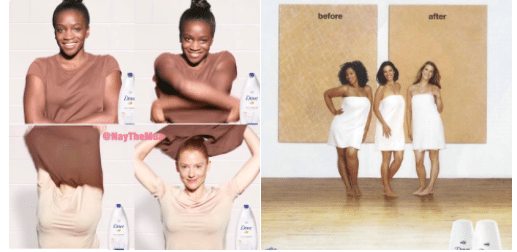
Dove is in crisis mode after running a Facebook advertisement many are calling racist. The ad, a GIF which featured a black woman removing her shirt to reveal a white woman, was pulled after being widely shared on social media and covered in national news outlets. Dove owned the tone-deaf nature of the ad in a statement:
An image we recently posted on Facebook missed the mark in representing women of color thoughtfully. We deeply regret the offense it caused.
— Dove (@Dove) October 7, 2017
Another statement from a Dove spokesperson also noted the brand "got it wrong," while stating Dove's original aim for the ad was "a celebration of diversity." (The spokesperson was unavailable for comment.)
But it appeared that the personal care brand, owned by Unilever, hadn't quite built up the goodwill with audiences it needed to back the statement. Some users pointed to a similarly problematic Dove campaign in 2011. That ad portrayed a black woman in front of a "before" image of cracked skin, with a white woman positioned in front of the "after" side of the image.
Okay, Dove...
One racist ad makes you suspect.
Two racist ads makes you kinda guilty. pic.twitter.com/hAwNCN84h2— Keith Boykin (@keithboykin) October 8, 2017
Others took to social media with reminders of the skin-care industry's history of racist advertising, and journalists like The New York Times' Maggie Astor pointed to "a long-running racist trope in soap advertising: a 'dirty' black person cleansed into whiteness."
But even in recent history, Dove's misstep is hardly the first time a Western brand has brought on a messaging crisis of this nature. Nivea's now-infamous "White is purity" ad of April 2017 comes to mind, as does Pepsi's ad the same month, which drew ire for trivializing the Black Lives Matter movement.
Given how many brands fumble in getting across respectful messaging around race and diversity, it's crucial for all communicators to ensure their brands have an internal review process for all content, including an employee culture that nixes off-mark messaging long before it reaches the public.
And behind every piece of offensive content is the team or employee that generated that content, which means organizations must perform regular audits of diversity and inclusion practices to ensure messaging is examined from a variety of viewpoints (e.g., by staff from different ethnic backgrounds) throughout a campaign.
Jessica Fish, founder of the startup Inclusiv Us and senior consultant to research and consulting firm Leader Networks, works regularly with brands to ensure their messaging doesn't miss the mark in terms of gender, race or cultural identity. Fish holds that all brands benefit from a "sustained investigation around how implicit biases present themselves inside the workplace."
She recommends the following resources for internal communicators committed to enacting inclusivity programs with staying power:
- Google's re:Work articles on "unbiasing"
- A 2016 study on unconscious bias by University of North Carolina Executive Development program director Horace McCormick
- Taking and disseminating one of Harvard's implicit bias tests
Follow Sophie: @SophieMaerowitz
Follow Jessica: @fishica
